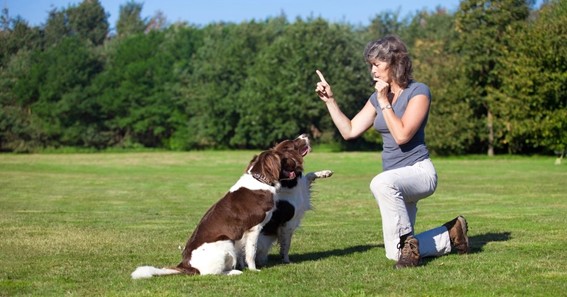No, it is not! Dogs of any age can be trained. On the other hand, Puppies learn faster and are easier to train than older dogs. While older dogs may take longer to learn new skills, they can still be taught efficiently with patience and consistency. New training exercises should be introduced gradually, and positive reinforcement for good behavior should be used to motivate your dog to continue learning. With enough time and dedication, you may successfully train your dog at any age. Below are key points from Williamsburg dog training to help you out:
Untrain Bad Habits First
You will need to be extra patient when training an older dog, as they may have already developed some bad habits that you will need to untrain. Be consistent with your commands and rewards, and remain patient throughout the process. Some bad habits that you will have to untrain include:
Jumping up: Dogs often jump on people to greet them or get attention. This behavior needs to be discouraged from starting, as it can be difficult to break an older dog of this habit.
Pulling on the leash: If your dog pulls on the leash when you go for walks, likely, they have not had much leash training in the past. Start with basic obedience commands such as “sit,” “stay,” and “heel.” Once your dog responds well to these commands, you can start working on getting them to walk calmly by your side without pulling.
Begging is another common bad habit that dogs can develop. If your dog begs for food at the dinner table or during mealtime, it is essential to be firm and consistent in your commands. Please do not give in to their begging, as this will only reinforce the behavior.
Barking: Dogs bark for many reasons, including boredom, fear, anxiety, and excitement. If your dog is barking excessively, it is essential to find out the reason behind the behavior and address it. Sometimes, simply providing your dog with more exercise or mental stimulation can help to reduce their barking.
Destructive chewing: Chewing is a natural canine behavior, but some dogs may chew excessively on furniture, clothing, or other household items. If your dog is a chronic chewer, it is essential to provide them with plenty of chew toys and supervise them closely to prevent them from chewing on things they shouldn’t.
Teach Complicated Tricks after Simple Commands
Older dogs can learn complicated tricks, but you need to start with the basics and build on more complex commands. Make sure that your dog responds well to basic obedience commands before moving on to more complicated tricks. Some advanced tricks you can teach your dog include:
Playing dead: This trick is sure to impress your friends and family! To teach your dog to play through:
- Start by having them lie down on their side.
- Once they are in position, give the command “stay” or “bang.”
- Pretend to shoot them with your finger and say “bang” again.
- Give the order “rollover” or “roll over and play dead.”
- Once your dog is rolling over, praise them and give them a treat.
Speak or whisper. This trick is fun to teach and will get a laugh from onlookers. To prepare your dog to speak or whisper, start by having them sit or stand next to you. Once they are in position, say the command “speak” or “whisper.” As your dog starts to bark, praise them and give them a treat.
Crawl. This trick looks impressive and will get a lot of laughs. To teach your dog to crawl, start by having them lie down on their stomach. Once they are in position, give the command “crawl” or “creep.” As your dog starts to crawl, praise them and give them a treat.
Keep Age in Mind
Remember that your dog is not a puppy anymore and may not have the same energy or stamina as it used to. When training your older dog, keep their age and physical abilities in mind. For example, if your dog can no longer jump, don’t try to teach them tricks that require them to do so. Instead, focus on tricks that they can do comfortably and without strain.
Try an Obedience Class
If you have trouble training your older dog, consider signing up for an obedience class. These classes are designed to help dogs learn basic obedience commands. Many obedience classes also offer trick-training courses that can be fun for you and your dog.
Be Positive and Patient
Training an older dog can be challenging, so it is essential to be patient. Remember to praise your dog often and give them plenty of treats to motivate them. With time and patience, you will be able to teach your older dog new tricks and enjoy spending time together.
It is never too late to start training your dog. Whether you are teaching them basic obedience commands or more complex tricks, it is essential to be positive and patient. With time and patience, you will be able to bond with your dog and teach them new things. If you have trouble training your older dog, consider signing up for an obedience class. These classes can be a great way to learn new training techniques and bond with your dog.






